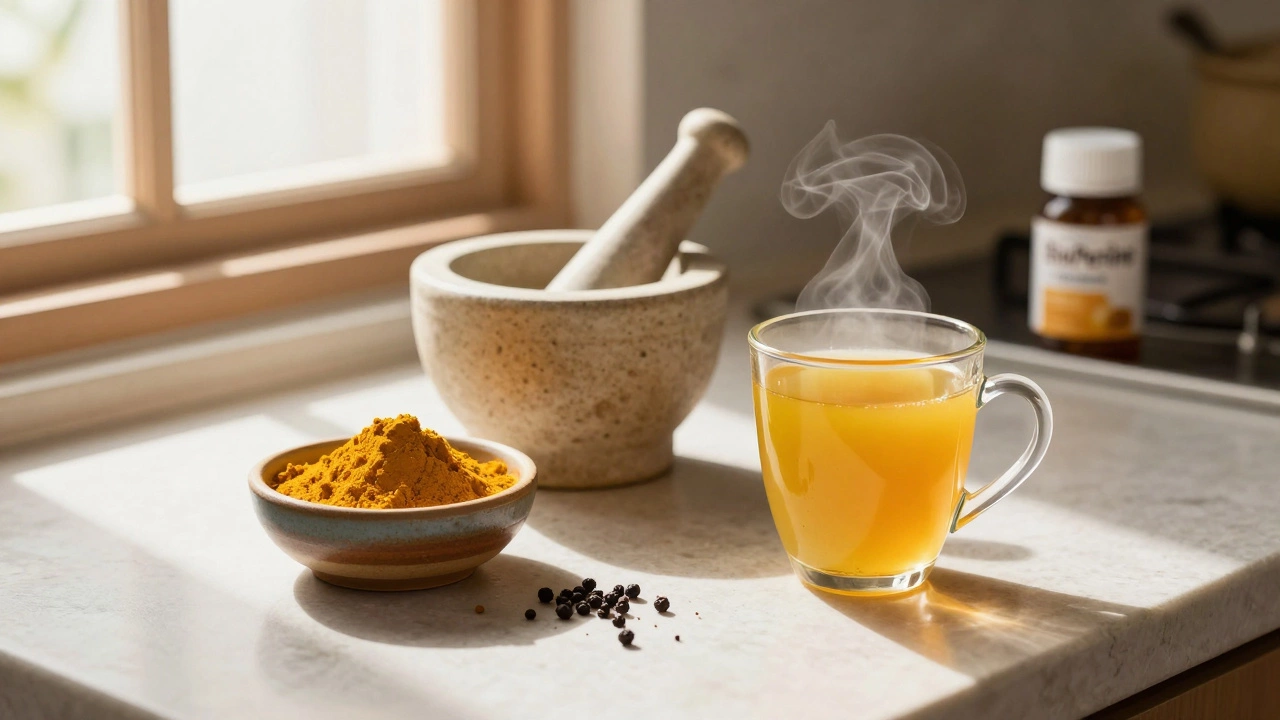Not all herbal supplement companies are equal. Learn what makes a brand trustworthy, the top 5 proven companies in 2026, red flags to avoid, and how to choose the right supplement for your needs.
Read MoreHerbal Supplements: Simple Guide to Natural Pain Relief & Wellness
If you’re looking for a gentler way to manage aches, boost energy or support digestion, herbal supplements are worth a look. They’re plant‑based products that concentrate the active parts of herbs – roots, leaves, seeds or bark – into capsules, powders or teas. Because they come from nature, many people assume they’re completely safe, but the truth is a bit more nuanced. Let’s break down what works, how to pick quality products, and ways to use them without over‑complicating things.
Top Indian Herbal Supplements for Everyday Use
Turmeric (Curcuma longa) – The bright yellow spice is famous for its anti‑inflammatory curcumin. A daily dose of 500‑1000 mg of a standardized extract can help ease joint pain and support heart health. Pair it with a pinch of black pepper to improve absorption.
Ashwagandha (Withania somnifera) – Often called “Indian ginseng,” this adaptogen helps the body handle stress. Around 300‑600 mg of a root extract taken once or twice a day can calm nerves, improve sleep, and even boost muscle strength.
Ginger (Zingiber officinale) – Fresh or powdered ginger works well for nausea, digestion, and mild muscle soreness. A simple 1‑gram ginger powder mixed in warm water after meals does the trick for most people.
Neem (Azadirachta indica) – Neem leaves have antibacterial and skin‑clearing properties. Neem leaf powder (200‑400 mg) or neem oil capsules are popular for acne, eczema, and detox support.
Tulsi / Holy Basil (Ocimum sanctum) – Tulsi is great for respiratory health and stress reduction. A daily cup of tulsi tea or a 300‑mg leaf extract helps keep the immune system on track.
How to Use Herbal Supplements Safely
First, start low and go slow. Even natural compounds can cause reactions if you jump to a high dose. Begin with the smallest suggested serving and see how your body reacts for a week before increasing.
Second, check the label for standardization. A good supplement will list the active ingredient percentage (e.g., 95% curcumin) and the extraction method. This makes it easier to compare brands.
Third, watch out for interactions. If you’re on blood thinners, high‑dose turmeric or ginger might boost bleeding risk. Same story with ashwagandha and thyroid medication. When in doubt, ask a doctor or pharmacist.
Fourth, buy from reputable sources. Look for manufacturers that follow GMP (Good Manufacturing Practices) and have third‑party testing. Certifications like ISO or FSSAI (India’s food safety authority) add an extra layer of trust.
Finally, remember that herbs complement—not replace—medical treatment. If you have chronic pain, diabetes, or heart issues, keep your doctor in the loop before adding any new supplement.
Putting it all together, a practical routine could look like this: a morning capsule of ashwagandha, a midday turmeric tablet with black pepper, and an evening cup of tulsi tea. Add ginger powder to your post‑lunch soup if you struggle with digestion. Adjust based on your goals and any feedback your body gives you.
Herbal supplements can be a powerful ally when you choose the right products, respect dosage, and stay aware of possible interactions. With a little guidance, you’ll be able to tap into India’s rich plant heritage for everyday health without the guesswork.
Turmeric is the most effective herb to take daily for reducing inflammation and supporting long-term health. Ashwagandha, ginger, and garlic also offer proven benefits when taken consistently and safely.
Read MoreLearn how to pick safe, effective herbal supplements by checking labels, third‑party testing, dosage, and credible sources. A practical guide for confident buying.
Read MoreCurious about supplements? Discover the five main types, their benefits, science, and safety tips, with key facts and practical advice to help you make informed choices.
Read MoreThinking about trying ashwagandha? This article tackles the real safety facts behind this popular herbal supplement. It breaks down what ashwagandha actually is, who should avoid it, how much is okay, and what side effects to watch out for. You'll get research-backed info, simple safety tips, and answers to common worries—so you can make a smart decision for your health.
Read MoreLooking for the best herbal company? Picking the right herbal supplement brand can feel overwhelming with so many choices out there. This article breaks down what separates good herbal companies from the rest, spotlights top brands, and shares real tips for spotting quality products. Get facts on certifications, sourcing, and what to watch out for if you're shopping for natural health support. You'll leave confident about which herbal companies deserve your trust (and money).
Read MoreHerbal supplements are often seen as a natural and safe option for improving health, but some can cause liver toxicity. This article explores which herbs pose a risk to liver health. Readers will discover the specific herbs linked to liver issues and learn about safe usage and guidance on what to watch for while using herbal supplements. Understanding these risks can help make informed choices about supplement use.
Read MoreMany people seek alternatives to Xanax due to the potential side effects and dependency issues associated with the medication. Herbal supplements offer a natural way to alleviate anxiety symptoms. This article explores some common over-the-counter herbs and remedies that might help. We will discuss their benefits, potential drawbacks, and tips for integrating them into a daily routine.
Read More











